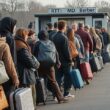A significant majority of Germans are urging Chancellor Friedrich Merz to exercise greater caution in his public pronouncements, according to a recent Forsa poll commissioned by “Stern” magazine. The survey reveals that 66% believe Merz needs to be more deliberate and thoughtful in his word choices, highlighting a growing concern over the impact of his statements. Only 30% find his current communication style appropriate and accurate, while 4% expressed no opinion.
This call for increased sensitivity comes in the wake of repeated instances where Merz’s phrasing has sparked widespread condemnation. Previous remarks, including references to “little Pashas” in classrooms and the characterization of refugees from war-torn Ukraine as engaging in “social tourism” have drawn criticism for their perceived insensitivity and potential to stoke societal division.
The disapproval transcends conventional political divides. The poll indicates overwhelming discontent, with 96% of supporters of the Left party, 92% of Green party voters and 83% of SPD members expressing dissatisfaction with Merz’s communication. Even within the ranks of the far-right AfD, a notable 50% share concerns about his rhetoric. While a majority (55%) of Union party supporters currently approve of his communication, a substantial 44% of his own base are also advocating for a more considered approach.
The survey underscores a growing disconnect between Merz’s messaging and broader public sentiment, raising questions about his ability to effectively lead and unite the nation. The calls for greater care in his words are not simply about semantics; they represent a broader anxiety surrounding the tone of political discourse and its potential to exacerbate existing societal tensions, even within his own political constituency. The need for a recalibration in Merz’s political communication strategy appears urgent, particularly if he aims to maintain public trust and navigate the complexities of Germany’s current social and political landscape.





